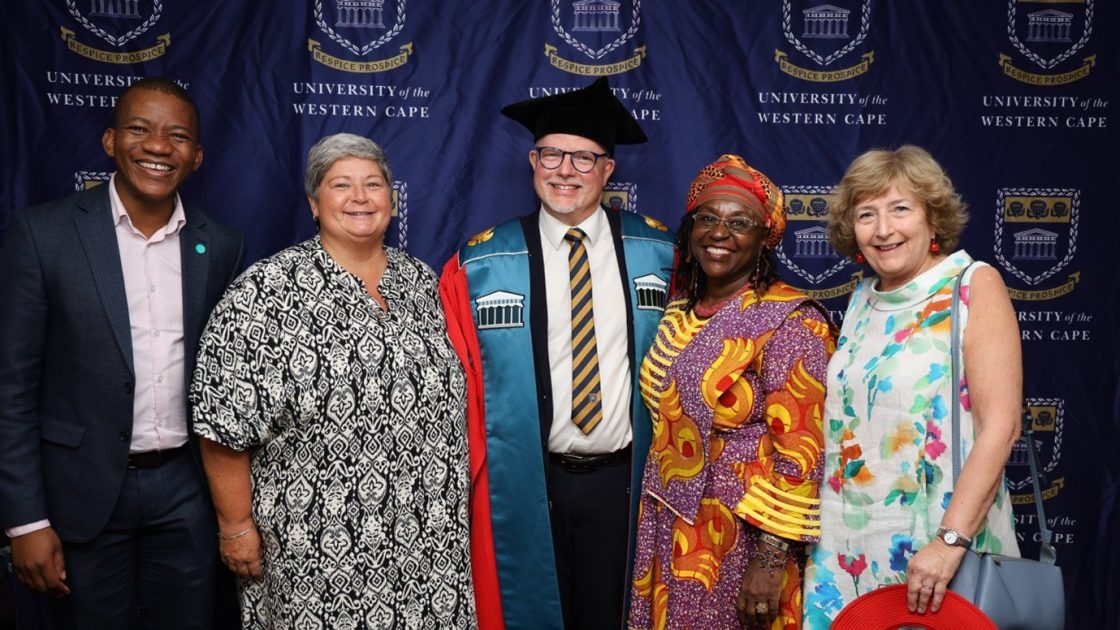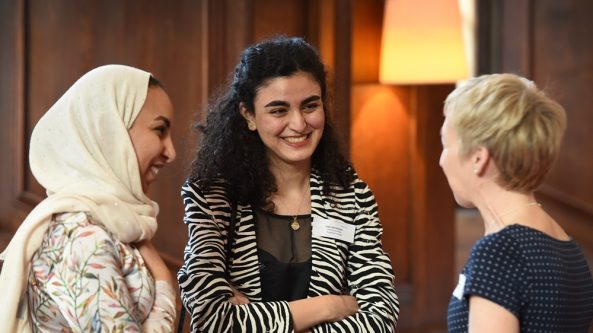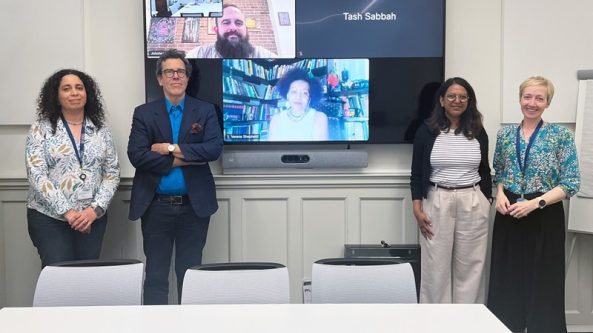Cambridge Trust alumni lead the way in Higher Education in Africa

Professors Thabo Msibi, Sharlene Swartz, Robert Balfour, Fatuma Chege and Madeleine Arnot at the inauguration of Professor Robert Balfour as Vice-Chancellor of the University of the Western Cape (UWC), 15 February 2025
As Professor Robert J Balfour is inaugurated as Vice-Chancellor and Rector of the University of Western Cape (UWC) in South Africa, we celebrate the exceptional group of African scholars working in Education who have been supported by the Cambridge Trust, and the positive impact they have made on Higher Education.
The Cambridge Trust has brought together many extraordinary scholars from Africa. What unites this group of talented educationalists is their commitment to using education to tackle social inequality, drawing on their personal experiences to develop new inclusive educational policies and highlight the important role of leadership in breaking down barriers related to poverty, social exclusion, and sexual and racial discrimination.
Now appointed to leading roles in university governance in Africa and the UK, they share a drive to reshape education systems to enable others to share in the wealth of opportunities that education gave them. Let’s meet them…
Robert Balfour’s impressive appointment at UWC in February acts as fitting recognition for the outstanding career he has built since completing his PhD in the Faculty of Education at the University of Cambridge, under the supervision of Professors Michael Evans and Madeleine Arnot.
Having developed an international reputation for his work on multilingualism, equity and postcolonial studies education, Professor Balfour made it his mission to foster growth in higher education as a way of addressing systemic social inequalities in South Africa and beyond. As he argued in his inaugural address at UWC – if change was needed then he would have to create that change himself.
“Freedom is never won in full or permanently. Sustaining and deepening it requires constant commitment”
Robert was promoted to a Professorship in English Studies and Education at the University of Kwazulu-Natal (UKZN) and later spent 7 years as Deputy Vice-Chancellor: Teaching and Learning, at the North-West University (NWU) in Gauteng, South Africa.
He has published rich research on aspects of educational inequality such as rural education disadvantage, digital literacy, and language rights. His manifesto Education in South Africa: Crisis and Change described how the country might move away from the race hierarchies of the apartheid period, and towards the ideals of race integration and the creation of a non-sexist and non-racist Rainbow Nation.
Gaining Cambridge Trust scholarships also greatly helped three outstanding South African scholars: Professors Sharlene Swartz, Thabo Msibi and Ranjani Naidoo.
Professor Sharlene Swartz has risen to become Divisional Executive of the Equitable Education and Economies research programme at the Human Sciences Research Council (HSRC) and Honorary Professor of Education at the University of Cape Town.
Her commitment to transformative education, reimagined inclusive economic development, and decolonising, emancipatory practices in research are demonstrated by her ground-breaking doctoral research Ikasi: the moral ecology of South Africa’s township youth revealing how young people living in poverty represent, understand, and enact morality and by Another Country: Everyday social restitution (2016) which drew on extensive discussions with the Archbishop Desmond Tutu.
Professor Thabo Msibi has recently been appointed Deputy Vice Chancellor (Teaching and Learning) at the University of KwaZulu Natal (UKZN).
His doctoral research highlights the complex sexuality and gender issues within education systems, and his publications include Hidden sexualities of South African Teachers: Black male educators and same-sex desire, the co-edited collection Gender, Sexuality and Violence in South African Educational Spaces and his contribution as Associate Editor to The Oxford Encyclopedia of Gender and Sexuality in Education.
In 2022, Professor Msibi was appointed by the Minister for Basic Education to serve on the sixth Umalusi Council on educational standards.
Professor Rajani Naidoo. Formerly Vice-President (Community and Inclusion) at the University of Bath, in 2023 she was appointed Deputy Vice Chancellor (People and Culture) at the University of Exeter whilst also Visiting Professor, and Chair for Critical Studies in Higher Education Transformation, at Nelson Mandela University in South Africa.
Professor Naidoo's research interests include public sector markets and new public management; trans-national higher education, global governance and international development; and the changing identity and nature of student participation in higher education.
She established the Professional Doctorate of Business Administration in Higher Education Management (DBA) which is aimed at creating critical university leaders from some 69 countries, focusing in particular on the importance of research on the special role of universities in society. Today she co-edits the Palgrave Macmillan series Global Higher Education and African Higher Education Dynamics (African Minds).
They bring to higher education not just their specialist theoretical and methodological skills but also their commitment to ensuring that, whilst they have come through, others do too.
Another two groundbreaking African educationalists who undertook their studies in the Faculty of Education have risen to leading positions in their universities: Professor Fatuma Chege and Professor George Oduro.
Professor Fatuma Chege from 2019 to 2023 held the post of Deputy Vice-Chancellor (Administration) at Kenyatta University Nairobi, Kenya.
As founder of the Women Education Researchers of Kenya (WERK), Professor Chege is a powerful role model for women. She was the first female Dean of Faculty at Kenyatta University, and the first woman to act as Deputy Vice-Chancellor (Administration) from 2019-2023.
She served as Principal Secretary in the Ministry of Education and chaired the Taskforce on Effective Curriculum Reforms Implementation in Kenya which had national impact.
Professor George Oduro rose, in his words, from being ‘a houseboy’ to becoming Professor of Educational Leadership, Director of the Institute for Educational Planning and Administration (2008 to 2012), Provost of Distance Education (2012 to 2014) and then Pro-Vice Chancellor (2015 to 2018) at the University of Cape Coast, Ghana.
His postdoctoral career has been focused on the role of leadership in improving the quality of teaching and learning in educational institutions, from schools to higher education, creating opportunity for children from poor family backgrounds and from rural disadvantaged schools.
To this exceptional career was added the accolade of being appointed by the President of Ghana to become the Technical Advisor to the Minister of Education and to chair the Ghanaian 2025 National Education Review Committee.
The incredible achievements of this group of former Cambridge Trust scholars demonstrates the value now being placed on appointing educationalists to the senior ranks of university governance in Africa, and we are proud to watch them flourish and see the impact they make.




